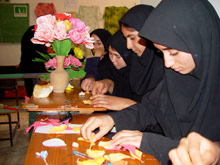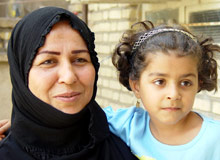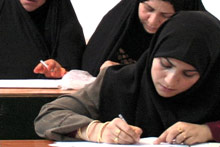News
Adult Education Offers New Opportunities and Options to Iranian Women
- 07 March 2006
News
Educating women and girls is a powerful lever for their own empowerment and for their country's development. Through its adult education programmes, the Literacy Movement Organization spreads messages about reproductive health, builds life skills and provides vocational training. In so doing, it reaches vulnerable and underserved populations throughout the country and advances social development.
* * *
AHVAZ, Islamic Republic of Iran — Flying over Khuzestan, a southwest Iranian province, one can see a vast expanse of arid plains punctuated by the flaring of gas fires at dozens of oil drilling rigs. In spite of rich oil resources, however, this area bordering Iraq is one of the poorest and least developed provinces of the country. Its inhabitants earn far less than the national average of about $400 per person and unemployment is high.

Oil exploration and development has improved the city's economy. But in 1980, Iraq invaded Iran, and Khuzestan was heavily bombed. The area's physical and social structures, as well as its economy, still bear scars from a decade of conflict.
"Now, I know that if I keep up with my education, my daughter will have someone to help her with her homework, and she will be able to help in my business as well. "
--Nabieh, one of the students in the Ahvaz Community Centre
Young people are migrating from rural areas to Khuzestan's capital, Ahvaz (population 750,000) in search of work. But even though the city has become a major supply and distributing centre for the oil fields that lie to the north, many young people still have trouble finding good jobs.
In the old part of the city, men gather in small groups on corners until the muezzin calls them to prayer. Children play in dusty alleys with homemade toys. Girls in the marketplace try to sell off household goods to bring in extra cash, but there aren't many buyers in the searing midday heat. The mood changes abruptly, however, when we enter a small house that has been converted into a Community Learning Centre.
In a rectangular courtyard that was once a garden, dozens of women - from teenagers to grandmothers - have books open and hands raised. Further back, two women are beating out dough to make traditional flat bread over a gas fire. Down the hall, several others are weaving a carpet at a large loom. In another room, two young women chat as they cut out petals and leaves out of felt and use them to construct artificial flower arrangements. Except for the girls under 13 in their colourful smocks, all the women are covered from head to toe in black. All seem to be happy to be catching up on their education and learning skills that can help them in work and life.

Twenty-seven-year-old Nabieh has been coming to the centre for three years now. In that time, she learned to read and write and took sewing and business classes. Through the centre she was able to take out a small loan to buy a sewing machine and develop the skills to start a small tailoring business. All of this has built her confidence and given her more optimism about the future.
"Now, I know that if I keep up with my education, my daughter will have someone to help her with her homework, and she will be able to help in my business as well," said Nabieh.
The new business provides a significant addition to the household income, especially since Nabieh's husband works only part-time at a local factory. The couple live with their daughter in one room of his mother's home, where Nabieh also meets with clients and does alterations. Her tailoring business brought in $60 last month, enough to make her loan payment and pay many of the family's basic living expenses. But she dreams of something more: a small shop of her own.
The idea behind the Community Learning Centre, which is part of a major adult education programme called the Literacy Movement Organization, is to multiply Nabieh's success across communities, especially those in rural and underdeveloped areas, and throughout the country. Designed especially for those who never learned to read and write, the programme is credited with much of the country's success in reducing illiteracy from 52.5 per cent in 1976 to just 6.2 per cent, at the last count in 2002. The movement has established over 2,000 community learning centres across the country, employed some 55,000 instructors, distributed 300 easy-to-read books and manuals, and provided literacy classes to a million people, men as well as women. The initiative pays particular attention to the needs of women who head households. In addition to teaching basic academic skills and vocational training, the programme offers classes in 'skills for life', such as child care, communication and self-esteem.
"We listen to our clients - that's how we learn what they need and how we can help them," said Mohammed Mehdizadeh, DGP of Educational Affairs. "Of course, before a person can become skilled, they first need to learn to read and write."

Some of the Islamic Republic of Iran's broad social programmes, like this one, have been extremely successful in tackling critical development issues. For instance, decades ago, the country's leaders recognized that its rapid population growth was outpacing its ability to provide for its people, and mobilized around a goal of lower fertility. The results were revolutionary.
Both the literacy and family planning initiatives were implemented by the Government with strong technical support as well as funding from UNFPA, the United Nations Population Fund. The Fund's specific contributions to the Literacy Movement Organization include training of more than 7,000 teachers, development of a nine-episode television series on reproductive health issues, and procurement of computers and other equipment.
The literacy movement is remarkable for the breadth of its work. In centres across the country, it offers nearly a hundred courses on a wide variety of subjects from child rearing, family planning and HIV prevention to setting up a cooperative and beekeeping. In this way, it addresses many development goals through one programme. Booklets on many of these subjects are being shared with neighbouring Islamic countries.
"We base our approach on their specific needs – we tailor our programming based on what they need for themselves, their families and their communities," said Mehdizadeh. And it is helping Nabieh and thousands of women like her to further their education. Investing in the education of girls and women, as the UN Millennium Project experts agree, offers high payoffs in terms of poverty reduction, the educational and health status of the next generation, HIV prevention, infant and maternal health, income-earning prospects, reduced fertility and the elimination of harmful practices.
— Alvaro Serrano, Janet Jensen